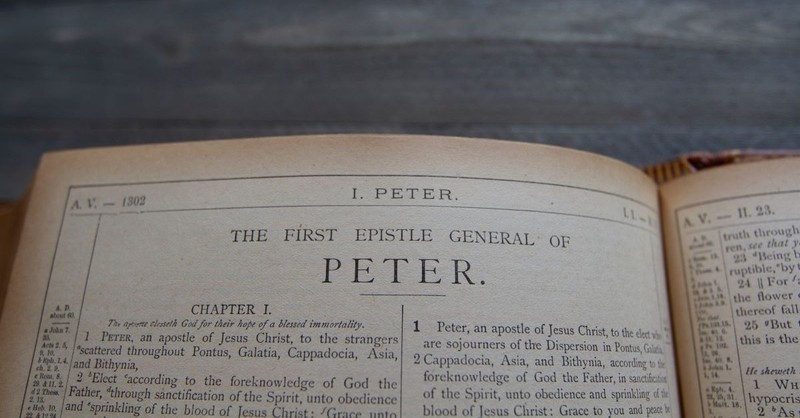
For over two thousand years, many have recognized Simon Peter as the brash and outspoken apostle of Jesus Christ. As a former fisherman, Peter was called by Jesus to become a fisher of man. In doing so, he would drop his nets, and like the others, leave everything behind to follow Jesus. Peter was the one who got out of the boat to walk with Jesus on the waves, was an eyewitness to the transfiguration of Jesus, then denied even knowing Jesus the night before His crucifixion. To say that Peter was unpredictable and, at times, unreliable would be an understatement. Nevertheless, Peter was recognized as a natural leader by others, including Jesus.
Jesus had chosen Simon Peter to be His trusted apostle, and though he had many faults, Christ was daily refining and transforming this impulsive young man into a bold and effective leader, pillar of the early church, and living epistle known and read by all men (2 Corinthians 3:2-3). Peter’s flaws and failures were evident. Nevertheless, because of Christ’s love and mercy, Peter’s story would ultimately be one of redemption.
Here, then, are seven lessons from Peter on grace and forgiveness.
Photo credit: ©GettyImages/Boonyachoat

1. Those Closest to God Are the Most Broken over Their Sin
Peter’s denial of his friend, rabbi, and master was arguably one of his greatest failures as a disciple of Jesus Christ. It did not help that just hours before Peter denied even knowing Jesus that he had emphatically professed that he would never deny Him. In his pride, he had even set himself above the other disciples, saying, “Even though all may fall away because of you, I will never fall away” (Matthew 26:33). “Lord, with you I am ready to go both to prison and to death,” he would go on to proclaim (Luke 22:33). It was a bold statement, one fitting of Peter’s bravado. And yet, mere hours after Peter made his famous promise, the veneer of Peter’s courage and loyalty came crashing down as his words came back to haunt him.
Accordingly, when Peter realized the extent of his denial and betrayal, the Bible tells us that Peter “went out and wept bitterly” (Matthew 26:75; see also Mark 14:72; Luke 22:62). Peter knew that he had utterly failed Jesus. In fact, his reaction was reminiscent of an earlier encounter with Jesus, in which Peter fell at the feet of Jesus and proclaimed, “Go away from me, Lord, for I am a sinful man.” (Luke 5:8). On both occasions, Peter demonstrated that those closest to Christ are often the ones who are the most broken over their sins, realizing how unworthy they are of God’s goodness. Throughout his life, however, Jesus was willing to forgive and restore Peter. Having encountered the underserved grace of Jesus, Peter would later conclude that “the Lord is not slow about His promise, as some count slowness, but is patient toward you, not wishing for any to perish but for all to come to repentance” (2 Peter 3:9). If anyone understood the patient mercy of Jesus Christ, it was Simon Peter.
Photo Credit: ©iStock/Getty Images Plus/kevron2001

2. Peter Was Given a New Name as a Reminder of Who Jesus Wanted Him to Be
For most of his life, Peter was known to his family, friends, neighbors, and coworkers as Simon, a relatively common name in first-century Israel and one that was given to him at birth. Upon first meeting Jesus, however, Simon was given a new name. “You are Simon the son of John,” Jesus said, “you shall be called Cephas (which is translated Peter)” (John 1:42).
Why the new name?
To remind Simon of what He saw in him and wanted him to become, Jesus occasionally called Simon Peter, a nickname meaning “rock.” For most of his life, however, Simon Peter behaved more like a Simon than a rock or a Peter. Early on, he rarely lived up to the name Christ had given him. Similarly, even those who are redeemed and forgiven often fail to behave like those who are redeemed and forgiven. Like Peter, we, too are at war with our flesh and former ambitions. And like Simon, we sometimes return to our former ways and habits (2 Peter 2:17-22). This is why the apostle Paul encouraged believers to “lay aside the old self” and “put on the new self, which in the likeness of God has been created in righteousness and holiness of the truth” (Ephesians 4:22-24). Peter, like all of us, occasionally needed a reminder of who he was called to be and should be in Christ. The name of Christ, which has been given to us, is our reminder (Acts 4:8-12).
Photo credit: ©PlayBackMedia/Sparrowstock

3. Peter Had to Learn to Fix His Eyes on Jesus
The failures of Simon Peter have been thoroughly exposited through countless sermons, studies, and devotionals over the years. Of course, Peter’s denial of Jesus vies for top spot as the worst moment in Peter’s life. However, some have pointed to Peter’s lapse in faith on the Sea of Galilee as an equally disappointing moment. In that story, Peter stepped out of the tiny boat to walk with Jesus on the waves. However, “seeing the wind, he became frightened, and beginning to sink, he cried out, ‘Lord, save me!’” (Matthew 14:30). As He often did, Jesus reached down and rescued His friend. Although Jesus would rebuke Peter for his doubt, in moments such as these, Jesus was shaping Peter into the shepherd and leader that He wanted him to be.
As one who had fallen beneath waves of fear and doubt yet been rescued and redeemed on more than one occasion, Peter was uniquely equipped to preach on the importance of fixing one’s eyes on Jesus. To the Church, he would write, “Therefore, brethren, be all the more diligent to make certain about His calling and choosing you; for as long as you practice these things, you will never stumble” (2 Peter 1:10). Peter knew better than anyone that the battlefield of fear and doubt is waged in the minds of believers. After all, if a man who had walked on water with Jesus and been an eyewitness to countless miracles, including the transfiguration of Jesus, could lose faith and focus, how much more could we? When we take our eyes off of Jesus and forget that we are called and chosen (2 Peter 2:10), we are no longer condemned (Romans 8:1), we are cared for (1 Peter 5:7), and we can never be separated from the love of God (Romans 8:35-39), we too will sink.
Photo credit: ©GettyImages/KristiLinton

4. Complacency Leads to Stumbling
On the night before His crucifixion, Jesus would instruct Peter, James, and John to pray and keep watch with Him while He went away to be with the Father in the Garden of Gethsemane. However, on more than one occasion, Jesus would return to find His trusted friends asleep. “so you men could not keep watch with Me for one hour?” Jesus asked. “Keep watching and praying that you may not enter into temptation; the spirit is willing, but the flesh is weak,” He repeated (Matthew 26:40-41). Once again, however, the three disciples failed to remain vigilant in prayer. Ironically, Jesus had told Peter earlier that Satan had “demanded permission to sift you like wheat; but I have prayed for you, that your faith may not fail; and you, when once you have turned again, strengthen your brothers” (Luke 22:31-32).
Thankfully for Peter, denying Jesus was not the only thing Jesus predicted would happen later that evening. Peter’s faith would survive as he had been preserved, no doubt by Christ’s intercessory prayer. His complacency, however, would set him on a path to stumble. It was a mistake he would learn from in time. In fact, in one of his later letters, Peter would write, “Be of sober spirit, be on the alert. Your adversary, the devil, prowls around like a roaring lion, seeking someone to devour. But resist him, firm in your faith” (1 Peter 5:8-9). On the night Jesus was arrested, Peter had become complacent, underestimating the tenacity of his enemy. He was not as vigilant as Jesus had instructed him to be. As a result, Satan sifted Peter like wheat, leading to one of his worst moments in life. However, because of Christ’s mercy and intercession, Peter’s faith survived. And as Christ predicted, Peter emerged from this trial with wisdom to strengthen his brothers in Christ (1 Peter 4:7).
Photo credit: ©Getty Images/mycola

5. God Uses Trials to Test and Strengthen our Faith
Like the rest of the apostles, Peter was no stranger to persecution, tests, trials, and sifting. By the grace of God, however, Peter had been protected (1 Peter 1:5) and rescued from temptation on more than one occasion (2 Peter 2:9). Peter may have fallen harder and failed bigger than most of the apostles. However, the extent of his failure set the stage for Christ’s grace and mercy to shine all the brighter. Furthermore, Peter’s personal encounter with God’s grace and forgiveness offered him a divine perspective on suffering and trials in life. In writing to believers facing persecution, Peter would confidently affirm, “After you have suffered for a little while, the God of all grace, who called you to His eternal glory in Christ, will Himself perfect, confirm, strengthen, and establish you” (1 Peter 5:10-11).
Simon Peter may have been the epitome of raw material when he first put down his nets to follow Jesus. However, in his time with Jesus, the Lord would perfect, confirm, strengthen, and establish Peter like only He could. Like most of us, Peter did not always understand why he was going through the trials of life. Looking back, however, he could see the merciful hand of God at work. His encouragement to the Church, therefore, is profound: “greatly rejoice, even though now for a little while, if necessary, you have been distressed by various trials, so that the proof of your faith, being more precious than gold which is perishable, even though tested by fire, may be found to result in praise and glory and honor at the revelation of Jesus Christ” (1 Peter 1:6-7).
Photo credit: ©GettyImages/Thinkstock/GordonImages

6. Those Forgiven of Much Will Forgive Much
At times, the twelve disciples were as unloving, contentious, and prideful as they come. On one occasion, Jesus even caught His disciples arguing about who was the greatest among them (Luke 22:24-27). Like the rest, Peter would learn from the servant’s heart of Jesus as He humbly washed His disciples’ feet (John 13:5-17) and eventually laid down His life for His friends (John 15:13). As one forgiven of much, Peter would also learn to love and forgive others, especially those he was entrusted with shepherding (1 Peter 1:21; Matthew 18:21-22). We see this transformation in his later ministry and writings to the Church (1 Peter 4:8-10; 1 Peter 3:8-9; 1 Peter 5:5-6).
Furthermore, after the resurrection, Jesus appeared to His disciples on the Sea of Galilee and tested Peter’s love and devotion. Three times, the Lord asked, “Do you love me?” Three times, Peter replied, “Yes, Lord, you know that I love you.” The more He asked, the more it grieved Peter to be confronted with his failure. Nevertheless, in facing his shame, Peter revealed a true repentant heart that was met with the undeserved mercy of a loving savior. Jesus then instructed Peter to “tend” and “shepherd His sheep” (John 21:15-17), entrusting him to be an heir to His ministry and pillar of the church he would help build. In God’s grace, Peter was called and chosen to be an apostle of Jesus Christ; in His grace, Peter was forgiven and redeemed, and in His grace, Peter was included in God’s redemptive plan for His creation, which included both Jews and Gentiles (Acts 10).
Photo credit: Unsplash.com/Jaka Skrlep

7. Be Not Ashamed of the Gospel
Perhaps the greatest testimony of the redeeming work of Jesus Christ in the life of Peter can be found in the book of Acts. Shortly after Jesus had ascended into heaven, Peter and the apostles would follow Christ’s commission to share the gospel, make disciples of all nations, and build the early church. In this ministry, the man who had formerly denied Jesus and run away in fear had become an unashamed and fearless ambassador of the gospel (1 Peter 3:15-17), outspoken leader, and bold witness who refused to stop speaking of all he had seen and heard (Acts 4:19-20). Even under the threat of imprisonment, persecution, and death, Peter affirmed that he “must obey God rather than men” (Acts 5:29-32).
As his time on earth was coming to an end, Peter could rejoice in the eternal inheritance that awaited him when he reunited with his savior. By the wounds of Jesus Christ, Peter had been healed, forgiven, and redeemed (1 Peter 2:24); and like a sheep who had continually gone astray, he had returned to the Shepherd and Guardian of his soul (1 Peter 2:25). Flawed and imperfect, Peter was nevertheless called by Christ, who, in His grace, perfected, confirmed, strengthened, and established Peter from beginning until the very end.
Photo credit: ©PlayBackMedia/Sparrowstock
Originally published Monday, 18 March 2024.










